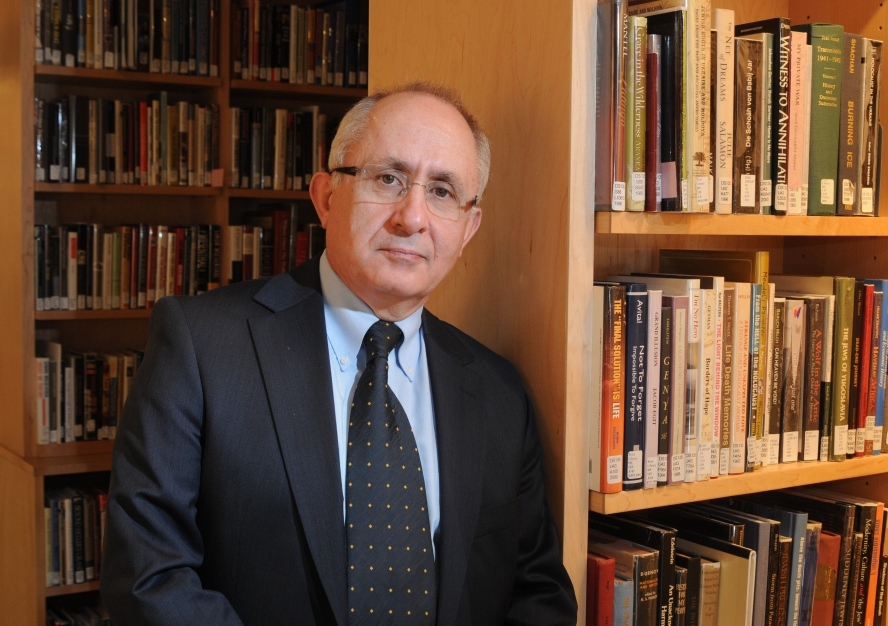By Harut Sassounian
Publisher, The California Courier
Prof. Taner Akcam struck a major blow to Turkish denials of the Armenian Genocide in a highly informative lecture at Ararat-Eskijian Museum-Sheen Chapel in Mission Hills, California, on November 20. Dr. Akcam, a Turkish scholar, is holder of the Robert Aram & Marianne Kalousdian, and Stephen & Marion Mugar Chair in Armenian Genocide Studies at Clark University.
Read also
In his recently published book, “The Memoirs of Naim Bey and Talat Pasha’s Telegrams,” Prof. Akcam laid to rest persistent Turkish denials of Naim Bey’s existence and authenticity of the telegrams he sold to Aram Andonian, who published them in his book, “Meds Vojire” (The Great Crime), in the early 1920’s in English, French, and Armenian. Andonian, a genocide survivor, first met Naim Bey, an Ottoman official, in the concentration camp of Meskene, Turkey, in 1916, and later in Aleppo, Syria, in 1918.
In a crucial telegram dated Sept. 22, 1915, Interior Minister Talat gave “the order that all of the Armenians’ rights on Turkish soil, such as the right to live and work, have been eliminated, and not one is to be left [alive] — not even the infant in the cradle; the government accepts all responsibility for this.” In another cable sent to the Provincial Governor of Aleppo on Sept. 29, 1915, Talat wrote: It “was previously reported that the decision to eliminate and annihilate all Armenians present in Turkey had been taken by the government, on orders of the Committee [of Union and Progress]… regardless of how horrible the annihilation measures, and without giving in to the pangs of conscience, an end will be put to their existence, be they women, children, or invalids.”
In 1983, the Turkish Historical Society published a book by Sinasi Orel and Sureyya Yuca, claiming that Talat’s telegrams published by Andonian were forgeries and that Naim Bey never existed. Orel and Yuca raised 12 arguments as to why they believed that these documents were fake. Although Dr. Vahakn Dadrian had published a detailed rebuttal to Orel and Yuca in 1986, some scholars remained doubtful of the materials included in Andonian’s book.
After a lengthy and painstaking research based on Ottoman archives made available in recent years, Prof. Akcam was able to prove conclusively that Orel and Yuca’s accusations were wrong and baseless. In his newly-published Turkish-language book and Nov. 20 lecture, Prof. Akcam asserted:
1) There was in fact a Turkish civil servant by the name of Naim Bey. Original Ottoman records confirm his existence. In fact, Volume 7 of the Turkish Military Archive published in 2007, contains a document that describes him as: “Naim Effendi, son of Huseyin Nuri Effendi, age 26, from Silifke, married, former dispatch officer at Meskene, currently employed as grain storehouse officer of the municipality (Nov. 14-15, 1916).” Akcam confirmed that there are three other Ottoman records with Naim’s name; two of them are in the Boghos Noubar Library in Paris.
2) Prof. Akcam announced that he had in his possession a copy of the original memoirs of Naim Bey, handwritten in Ottoman Turkish. He found the memoirs in the archives of noted researcher Father Krikor Guerguerian who had photographed Naim Bey’s 35-page manuscript while visiting the Boghos Noubar Pasha Library in 1950. The original has since disappeared from the library.
3) The names of individuals and events Naim Bey had described in his memoirs are corroborated by materials Akcam recently obtained from the Ottoman archives.
4) Akcam was able to confirm that Orel and Yuca’s main arguments about various aspects of Talat’s telegrams, including the type of paper used and coding techniques, were incorrect.
In his scholarly quest to prove that Talat’s telegrams included in Andonian’s book are authentic, and debunk Turkish claims that they are forged, Prof. Akcam has made a much more significant revelation. Talat’s Sept. 22, 1915 telegram confirms that Turkish leaders had ordered the wholesale massacre of all Armenian men, women, and children, and not simply their deportation as Turkish denialists have falsely claimed for over a century. By authenticating these telegrams, Dr. Akcam has shown that Talat had a murderous INTENT — a crucial element in qualifying the Armenian mass killings as genocide, according to the UN Convention on the Prevention and Punishment of the Crime of Genocide.





















































